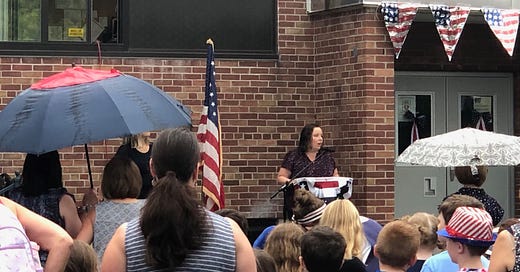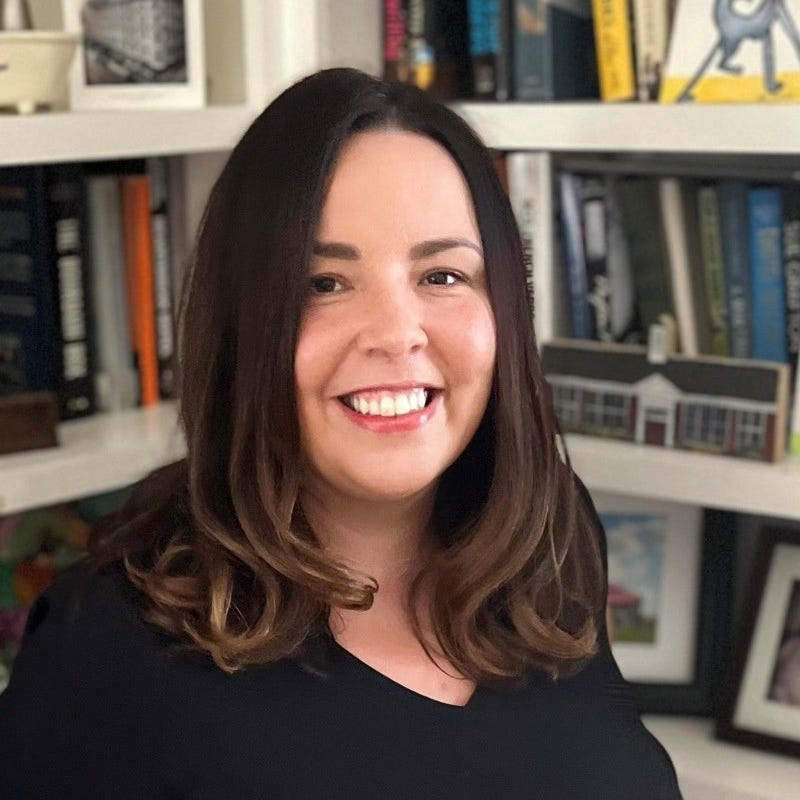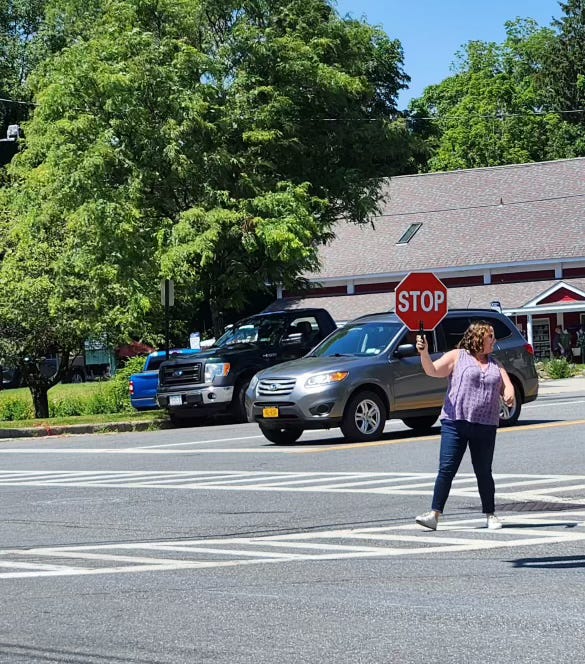By Darren Johnson
Journal & Press
Greenwich’s new mayor, Amanda Hurley, ran unopposed and was elected to the village’s top spot in March.
She moved with her extended family to Greenwich when she was 12 years old and attended Greenwich CSD, where, now, with her husband Kevin, she has two children, William and Louis, enrolled.
She and Kevin moved around the country – Amanda Hurley working hospitality and marketing jobs – before moving back to town eight years ago. She now works remotely as a Senior Marketing Manager at Lotus Marketing Inc. for major hotel brands.
She earned a master’s in Integrated Marketing Communications at West Virginia University and a BA from Bethany College.
I recently met up with her and conducted this interview:
DJ: I know it hasn’t been long, but how have you liked being mayor so far?
AH: It’s hard being the mayor because one of my downfalls is that I overanalyze everything, including the things I say. But overall I find it very enjoyable, helping others and building consensus and unity in the village.
DJ: I see that you were raised here, but left for a while, then came back eight years ago?
AH: I realized I needed to be closer to my [extended] family, and what better place to raise my own family than here?
DJ: It still must have taken some convincing to get your family on board?
AH: My husband is a city slicker. So I didn’t want to push him into it. Tell him “you have to live in Greenwich.” What if he got tired of it or wanted more of that metropolitan experience? But he liked Greenwich a lot and decided on his own. It was hard at first, though. There weren’t a lot of houses for sale.
DJ: So, after going to college and working all over the country, your hometown of Greenwich is the place where you’ve lived in the longest.
AH: I’ve been here eight years now, but I’ve always had an interest in being a part of the happenings of the town.
DJ: It seems like you gravitate to leadership roles, also serving a lot of groups, including being president of the PTSA.
AH: I get along with a lot of people because I think I’m really middle ground on things, and the world’s kind of so crazy with people being opposites. I just felt like if you’re not part of the solution, you’re part of the problem.
DJ: What was it like leaving the rat race of the corporate world?
AH: The hours started stacking up and the process started to become intense. So, I started looking for something else, and then I went to Lotus Marketing, which is a boutique marketing agency for hotels.
DJ: So your current job is remote and allows you the time to be mayor?
AH: Since becoming mayor, I go to the village office from 9 to 11. It kind of flexes a little bit. And I’m loving being around people. I didn’t realize I was starved for that. Of course, being a young mom, that’s helpful. Being a mom and being able to have control of your schedule.
DJ: What made you want to run for mayor?
AH: People recruited me, including Rulyn Graves [chair of the Greater Greenwich Chamber of Commerce and owner of Main Street businesses]. She knew me growing up, through high school. And I was always involved in everything. That’s actually something I’ve missed, having bounced around the country every few years.
I would just start getting into the community and then we’d have to move again.
I talked to [former mayor] Pam Fuller. She did a great job. So once I felt comfortable that I could manage work and being a parent, I was all in.
Now we’re trying to find more members of the village who are interested in serving.
DJ: What do you see as the job of mayor?
AH: We’d like to continue revitalizing the village to make it more attractive to bring other people in, and to make it a community center, where people can meet and hang out. I think the school does a good job of bringing people together. Of course, that’s just kind of parents and children, though.
But a village is where you really get to know people and understand them. And I think people get along better if they regularly see each other and you talk. And so having a village where people go to do things, whether it’s a restaurant or an event or what have you, I think bringing people together is the key to stability. Bringing people together, for example the recent new event, Union Village Fest. That was a nice event attractive to lots of different groups.
And people are very passionate about the village.
I want to make sure we continue on a path of growing the village sustainably; to looking at projects and looking at grants that will not increase the tax burden, or anything to help the infrastructure in this aging village. Water projects, there’s a lot of that to be done.
DJ: Does your PR/marketing background help?
AH: My experience in that work, professionally, has been similar to project management. I’ve dabbled in areas that can help us do these great projects.
But I’m humble enough to know that I don’t know what I don’t know. And I’ve learned that a lot in three months. But I feel like my background is appropriate to help those working for the village juggle all this.
DJ: I heard you also were out doing crossing guard work?
AH: One of the crossing guards had surgery. So we had to move crossing guards around, and we didn’t have anybody to be a crossing guard. So I went out and I was a crossing guard.
It doesn’t take much to pitch in. Like just do it. If more people pitch in, even better.
Instead of being keyboard warriors, and complaining, or saying anything negative, get involved. Show up.
DJ: How do you deal with all of the different personalities who contact the village for various matters?
AH: I feel like much of what I do is mediation between residents, but one thing I’ve learned is I have to listen and not look to make instant decisions. I’ve always struggled with that, I want things done fast, and I want them done perfect.
In the corporate world it’s like that, and that has probably burnt me a couple of times in terms of being a taskmaster. But here sometimes you have to slow down. And something might be very important to a group of people but you just see it as an object. So really slowing down and asking questions and relying on the longtime experts here for the history.
You know, the [Mowry Park] gazebo, for instance, painting that could be controversial for some. By the time we got to that point, I was like, okay, who needs to know that we’re thinking about painting the gazebo?
I think the PR background helps with that because you can kind of anticipate how long it takes to get information dispersed to the right people.
You also have to study where things came from and making sure people are included and involved when change is happening. And yes, not to slow down progress, but just out of respect to get things done and for the volunteers.
DJ: What’s one of your most pressing projects?
AH: The wastewater treatment plant, which we’re currently working on getting, some funding to get that upgraded. It’s under a Department of Health consent order, and we have to make upgrades to it.
We’ve got Kyle Vandewater and Willy Grimke on the board. It’s amazing having the two engineers. I feel like that is another part of my personality – feeling comfortable deferring to experts if I don’t have that background.
They can speak the language. They know how to ask the questions and we have construction progress meetings once a month.
If we didn’t have that, it would cost a lot of money to have paid consultants to help translate that to represent the village. So, having them is fantastic.
DJ: Your predecessor, Pam Fuller, did a good job working with the town and supervisor Jim Nolan. Do you plan to continue that partnership?
AH: We’re looking at a bike/pedestrian kind of grant. That’s in progress. What’s good for the village is good for the town. So the town should want to see the village succeed because we are the core, part of the business district and all of that. I think it naturally makes sense.
I know some people in the past wanted to dissolve the village and town into one. I don’t think that’s a great idea. There’s so many things that happen in the village that require a different set of skills than maybe the town has. And a different focus. Like, the town could say, “Let’s put a McDonald’s where Napa Auto Parts is.” The village residents might not want that. They might want to keep it cozy in the historical district, the historical buildings and all that.
So I think having a second set of people that focus specifically on that is good for our development. But yes, I’ll definitely continue to work with the town office. It also is favorable, like if we’re looking at grants ... they favor municipalities that work together.
Then it uses New York State funding in a way that’s more impactful. Versus doing, say, one in the village and one in the town with two separate projects. It’s better if it’s connected. It just makes sense.







